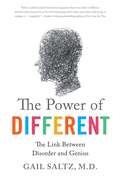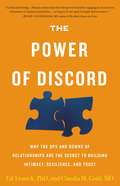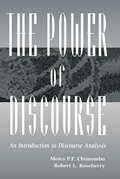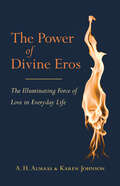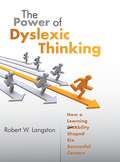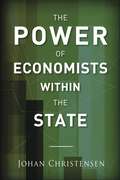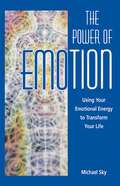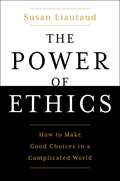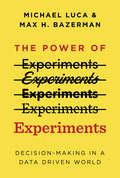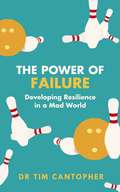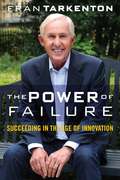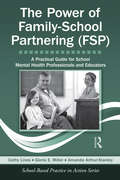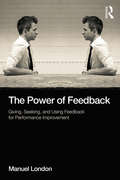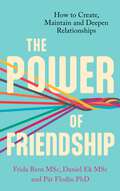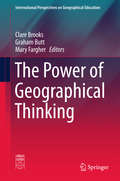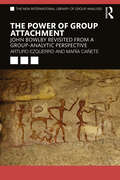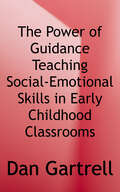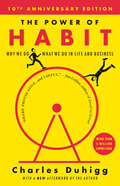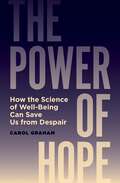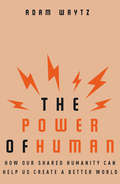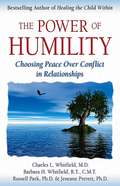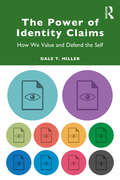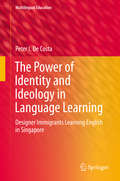- Table View
- List View
The Power of Different: The Link Between Disorder and Genius
by Gail SaltzA powerful and inspiring examination of the connection between the potential for great talent and conditions commonly thought to be “disabilities,” revealing how the source of our struggles can be the origin of our greatest strengths. InThe Power of Different, psychiatrist and bestselling author Gail Saltz examines the latest scientific discoveries, profiles famous geniuses who have been diagnosed with all manner of brain “problems”--including learning disabilities, ADD, anxiety, Depression, Bipolar disorder, schizophrenia, and Autism--and tells the stories of lay individuals to demonstrate how specific deficits in certain areas of the brain are directly associated with the potential for great talent. Saltz shows how the very conditions that cause people to experience difficulty at school, in social situations, at home, or at work, are inextricably bound to creative, disciplinary, artistic, empathetic, and cognitive abilities. In this pioneering work, readers will find engaging scientific research and stories from historical geniuses and everyday individuals who have not only made the most of their conditions, but who have flourished because of them. They are leaning into their brain differences to: *Identify areas of interest and expertise *Develop work arounds *Create the environments that best foster their talents *Forge rewarding interpersonal relationships. Enlightening and inspiring,The Power of Different proves that the unique wiring of every brain can be a source of strength and productivity, and contributes to the richness of our world.
The Power of Discord: Why the Ups and Downs of Relationships Are the Secret to Building Intimacy, Resilience, and Trust
by Claudia M. Gold Ed TronickThis "profoundly wise" look at how to foster connections, attachment, and resiliency explains why working through discord is the key to better relationships. (Sue Johnson, bestselling author of Hold Me Tight)You might think that perfect harmony is the defining characteristic of healthy relationships, but the truth is that human interactions are messy, complicated, and confusing. And according to renowned psychologist Ed Tronick and pediatrician Claudia Gold, that is not only okay, it is actually crucial to our social and emotional development. In The Power of Discord they show how working through the inevitable dissonance of human connection is the path to better relationships with romantic partners, family, friends, and colleagues.Dr. Tronick was one of the first researchers to show that babies are profoundly affected by their parents' emotions and behavior via "The Still-Face Experiment." His work, which brought about a foundational shift in our understanding of human development, shows that our highly evolved sense of self makes us separate, yet our survival depends on connection. And so we approximate, iteratively learning about one another's desires and intentions, and gaining confidence in the process as we correct the mistakes and misunderstandings that arise.Working through the volley of mismatch and repair in everyday life helps us form deep, lasting, trusting relationships, resilience in times of stress and trauma, and a solid sense of self in the world. Drawing on Dr. Tronick's research and Dr. Gold's clinical experience, The Power of Discord is a refreshing and original look at our ability to relate to others and to ourselves.
The Power of Discourse: An Introduction To Discourse Analysis
by Moira Chimombo Robert L. RoseberryThis volume is intended for students who desire a practical introduction to the use of language in daily and professional life. It may be used either as part of a course or as an aid to independent study. Readers will find that concepts relating to language and discourse are highlighted in the text, explained clearly, illuminated through examples and practice exercises, and defined in the "Glossary/Index" at the back of the book. Divided into two parts, this text presents an introduction to the elements and practice of discourse analysis in general, as well as an introduction to the actual kinds of discourse crucial to personal and professional life. In Part I, examples and practice exercises are used which make use of a variety of genres common in daily and professional life. Genres included are advertising, biography, travel guide, news clipping, prose fiction, students' writing, telephone conversation, poetry, police-suspect interview, face-to-face conversation, war cry, political speech, medical text, legislation, textbook, discourse of the mentally disturbed, and detective fiction among others. Wherever feasible, authentic examples are used. Part II of the book applies the principles and techniques of Part I to an investigation of discourse in daily use. Chapters include discourse in education, medicine, law, the media, and literature. Not only will these be of particular interest to students planning to enter any of these professions, but will also be of general interest, since all of us encounter them in daily life. As a result, this is a very practical book.
The Power of Divine Eros: The Illuminating Force of Love in Everyday Life
by A. H. Almaas Karen JohnsonWhat do desire and passion have to do with our spiritual journey? According to A. H. Almaas and Karen Johnson, they are an essential part of it. Conventional wisdom cautions that desire and passion are opposed to the spiritual path--that engaging in desire will take you more into the world, into egoic life. And for most people, that is exactly what happens. We naturally tend to experience wanting in a self-centered way. The Power of Divine Eros challenges the view that the divine and the erotic are separate. When we open to the energy, aliveness, spontaneity, and zest of erotic love, we will find it inseparable from the realm of the holy and sacred. When this is understood, desire and passion become a gateway to wholeness and to realizing our full potential. The authors reveal how our relationships become opportunities on the spiritual journey to express ourselves authentically, to relate with openness, and to discover dynamic inner realms with another person. Through embodying the energy of eros, each of us can learn to be fully real and alive in all of our interactions.
The Power of Dyslexic Thinking: How a Learning (dis)Ability Shaped Six Successful Careers
by Robert W. Langston<p>Robert Langston shares the inspirational stories of people who overcame the hurdles of living with dyslexia to become influential business and cultural leaders. From Kinko's founder Paul Orfalea to prominent financier Charles Schwab to Pulitzer Prize-winning cartoonist Mike Peters, Langston profiles some of the biggest players in the business world and elsewhere to paint amazing portraits of courage and dedication. <p>Through both research and personal experience, Langston has come to believe that dyslexia is a condition that does not need curing, but rather a greater understanding of the different capabilities and skills it can provide those who have it. He hopes that understanding more about the creative and intuitive benefits of dyslexia will allow educators and parents, as well as dyslexic children, to see dyslexia not as a disability, but as a gift.</p>
The Power of Economists within the State
by Johan ChristensenThe spread of market-oriented reforms has been one of the major political and economic trends of the late twentieth and early twenty-first centuries. Governments have, to varying degrees, adopted policies that have led to deregulation: the liberalization of trade; the privatization of state entities; and low-rate, broad-base taxes. Yet some countries embraced these policies more than others. Johan Christensen examines one major contributor to this disparity: the entrenchment of U. S. -trained, neoclassical economists in political institutions the world over. While previous studies have highlighted the role of political parties and production regimes, Christensen uses comparative case studies of New Zealand, Ireland, Norway, and Denmark to show how the influence of economists affected the extent to which each nation adopted market-oriented tax policies. He finds that, in countries where economic experts held powerful positions, neoclassical economics broke through with greater force. Drawing on revealing interviews with 80 policy elites, he examines the specific ways in which economists shaped reforms, relying on an activist approach to policymaking and the perceived utility of their science to drive change.
The Power of Emotion: Using Your Emotional Energy to Transform Your Life
by Michael SkyAn original model of the nature and workings of emotions.• Shows how to both unleash and harness the power of emotions to promote physical health, mental clarity, creativity, and more satisfying relationships.• Offers easy-to-follow breathing exercises that allow readers to tap into their reservoirs of vital energy to accomplish their goals.• By the author of Breathing: Expanding Your Power and Energy (25,000 sold).Emotions are the link between body, mind, spirit, and all our relationships, yet as Westerners we have been trained from our earliest years to repress our emotions. In our society, those who appear the least passionate are seen as strong, confident, and mature. In our desire to attain this goal, we often suppress our deepest emotions, eventually causing a blockage of energy that leaves us numb and unable to access our authentic feelings. Michael Sky explains that emotions are the vital energy source inside each of us that we can harness and direct in a positive way to promote better physical health, mental clarity, creativity, and more satisfying relationships. He details four simple but potent tools to aid in the productive channeling of powerful emotional energy: active acceptance; dynamic relaxation; conscious, connected breathing; and creative choice. Taken together these tools create a lifestyle that frees suppressed emotional energies and allows for empowered responses. With meditative breathing practices at the end of each chapter and inspirational passages from the teachings of Adi Da, readers will learn to positively experience and develop their emotions while enhancing their creativity and productivity to accomplish their goals.
The Power of Ethics: How to Make Good Choices in a Complicated World
by Susan LiautaudThe essential guide for ethical decision-making in the 21st century. It&’s not your imagination: we&’re living in a time of moral decline. Publicly, we&’re bombarded with reports of government leaders acting against the welfare of their constituents; companies prioritizing profits over health, safety, and our best interests; and technology posing risks to society with few or no repercussions for those responsible. Personally, we may be conflicted about how much privacy to afford our children on the internet; how to make informed choices about our purchases and the companies we buy from; or how to handle misconduct we witness at home and at work. How do we find a way forward? Today&’s ethical challenges are increasingly gray, often without a clear right or wrong solution, causing us to teeter on the edge of effective decision-making. With concentrated power structures, rapid advances in technology, and insufficient regulation to protect citizens and consumers, ethics are harder to understand than ever. But in The Power of Ethics, Susan Liautaud shows how ethics can be used to create a sea change of positive decisions that can ripple outward to our families, communities, workplaces, and the wider world—offering unprecedented opportunity for good. Drawing on two decades as an ethics advisor guiding corporations and leaders, academic institutions, nonprofit organizations, and students in her Stanford University ethics courses, Susan Liautaud provides clarity to blurry ethical questions, walking you through a straightforward, four-step process for ethical decision-making you can use every day. Liautaud also explains the six forces driving virtually every ethical choice we face. Exploring some of today&’s most challenging ethics dilemmas and showing you how to develop a clear point of view, speak out with authority, make effective decisions, and contribute to a more ethical world for yourself and others, The Power of Ethics is the must-have ethics guide for the 21st century.
The Power of Experiments: Decision Making in a Data-Driven World (The\mit Press Ser.)
by Max H. Bazerman Michael LucaHow organizations—including Google, StubHub, Airbnb, and Facebook—learn from experiments in a data-driven world.Have you logged into Facebook recently? Searched for something on Google? Chosen a movie on Netflix? If so, you've probably been an unwitting participant in a variety of experiments—also known as randomized controlled trials—designed to test the impact of different online experiences. Once an esoteric tool for academic research, the randomized controlled trial has gone mainstream. No tech company worth its salt (or its share price) would dare make major changes to its platform without first running experiments to understand how they would influence user behavior. In this book, Michael Luca and Max Bazerman explain the importance of experiments for decision making in a data-driven world. Luca and Bazerman describe the central role experiments play in the tech sector, drawing lessons and best practices from the experiences of such companies as StubHub, Alibaba, and Uber. Successful experiments can save companies money—eBay, for example, discovered how to cut $50 million from its yearly advertising budget—or bring to light something previously ignored, as when Airbnb was forced to confront rampant discrimination by its hosts. Moving beyond tech, Luca and Bazerman consider experimenting for the social good—different ways that govenments are using experiments to influence or “nudge” behavior ranging from voter apathy to school absenteeism. Experiments, they argue, are part of any leader's toolkit. With this book, readers can become part of “the experimental revolution.”
The Power of Failure: Developing Resilience in a Mad World
by Tim Cantopher'A lovely read' - Jeremy Vine, BBC Radio 2Failure is your friend, your teacher, your passport to success - life lessons from one of the UK's most esteemed psychiatrists.Dr Tim Cantopher spent four decades helping people get better - get better psychologically, emotionally, mentally. He has guided hundreds of men and women through anxiety, depression, addiction and other mental health issues. In The Power of Failure, he will share with you some of the most powerful lessons learned from his life in the psychiatrist's chair, with the aim of helping you get more joy from your life, to become more resilient and to achieve more by no longer fearing failure. Navigating the pitfalls of vulnerability and perfectionism, Dr Cantopher will show you how optimism and resilience can change the outcome of challenging events, and how to find lasting happiness that won't be derailed by negative emotions such as shame or fear. As an expert on toxic and dysfunctional relationships, he will give strategies for surviving narcissistic or destructive behaviours in your family or friends, and explain the benefits of kindness, consistency, persistence and pacing. Bringing together a lifetime's work in psychiatry with unparalleled expertise and clinical insight, this new book from the bestselling author of Depressive Illness: The Curse of the Strong has the power to change your life in the same way that Dr Cantopher has changed the lives of the many hundreds of people who have sought his help over the years.
The Power of Failure: Developing Resilience in a Mad World
by Tim Cantopher'A lovely read' - Jeremy Vine, BBC Radio 2Failure is your friend, your teacher, your passport to success - life lessons from one of the UK's most esteemed psychiatrists.Dr Tim Cantopher spent four decades helping people get better - get better psychologically, emotionally, mentally. He has guided hundreds of men and women through anxiety, depression, addiction and other mental health issues. In The Power of Failure, he will share with you some of the most powerful lessons learned from his life in the psychiatrist's chair, with the aim of helping you get more joy from your life, to become more resilient and to achieve more by no longer fearing failure. Navigating the pitfalls of vulnerability and perfectionism, Dr Cantopher will show you how optimism and resilience can change the outcome of challenging events, and how to find lasting happiness that won't be derailed by negative emotions such as shame or fear. As an expert on toxic and dysfunctional relationships, he will give strategies for surviving narcissistic or destructive behaviours in your family or friends, and explain the benefits of kindness, consistency, persistence and pacing. Bringing together a lifetime's work in psychiatry with unparalleled expertise and clinical insight, this new book from the bestselling author of Depressive Illness: The Curse of the Strong has the power to change your life in the same way that Dr Cantopher has changed the lives of the many hundreds of people who have sought his help over the years.
The Power of Failure: Succeeding in the Age of Innovation
by Fran TarkentonFailure is your key to success. So says Hall of Fame quarterback and hugely successful serial entrepreneur Fran Tarkenton. Don’t get him wrong--there’s no one more competitive or keener on winning than Fran. But in his inspiring and insightful new book, The Power of Failure, Tarkenton illustrates with hard, real-life examples why the most successful entrepreneurs are those with the courage, the resilience, the intelligence, and the competitive spirit to fail often, fail faster, and fail better--to achieve ultimate success. Candid, concise, quotable, and realistic, Fran Tarkenton is the best possible guide to finding success through the power of failure.
The Power of Family-School Partnering: A Practical Guide for School Mental Health Professionals and Educators (School-Based Practice in Action)
by Cathy Lines Gloria Miller Amanda Arthur-StanleyOngoing, strategic Family-School Partnering (FSP) is an essential component of every educational community. FSP is a multi-dimensional process in which schools, families, and communities engage in shared actions to ensure a child’s academic, social, and emotional success. With this text, the authors intend to offer a practical guide that demonstrates how this partnering can be strategically implemented in all levels of schooling. The main focus of the text is how to plan, implement, and evaluate FSP within existing school structures and resources. The authors begin with an overview of the foundational and organizational information necessary for successful FSP, including a review of ecological systems theory. FSP theories and strategies are presented at a universal, targeted, and intensive level, giving the school mental health professional insight into working with students and families who have differing needs. A school-based case example illustrates FSP in action and provides a practical roadmap for implementation. Each chapter contains easily adaptable tools and a list of useful web links to resources which can be used in conjunction with the strategies presented and discussed by the authors. An accompanying CD will also contain all the handouts, forms, and other such resources presented throughout the text.
The Power of Feedback: Giving, Seeking, and Using Feedback for Performance Improvement (Applied Psychology Series)
by Manuel LondonThis follow up to the 2003 edition of Job Feedback by Manuel London is updated to cover new research in the area of organizational management. This edition bridges a gap in research that now covers cultural responses to employer feedback, feedback through electronic communications, and how technology has changed the way teams work in organizations. The Power of Feedback includes examples of feedback from friends, family, colleagues, and volunteers in non-profit organizations. In this new book, both employers and employees will learn to view feedback as a positive tool for improving performance, motivation, and interpersonal relationships. Managers, human resource professionals, and students who will one day oversee teams will benefit from the research and advice found in The Power of Feedback.
The Power of Friendship: How to Create, Maintain and Deepen Relationships
by Daniel Ek Pär Flodin Frida Bern AnderssonThe Power of Friendship is a practical and accessible handbook that draws on more than thirty years of social science research and insights from modern psychology on how to create, maintain and deepen relationships.Decades of research show that strong relationships are at the very top of the list of what makes us happy and what helps us live long and healthy lives. Yet, we receive relatively little guidance when it comes to developing and nurturing our friendships as adults. This book unlocks the secrets to thriving social relationships and reveals the formula to create deep bonds and extraordinary connections. It contains more than forty exercises and techniques originating from authentic relating, non-violent communication, functional analytic psychotherapy, acceptance and commitment therapy, and much more.What makes some friendships last while others fade away? How can we deepen our connection with an acquaintance or someone we have known for years? How can we manage conflicts so that our friendships are not weakened but rather strengthened by them? When can and should we break up with a friend? All of these and more questions are answered and illuminated. Learn how to: - Make new friends- Move from mutual acquaintance to real friendship- Connect even deeper with the friends you have - Turn your vulnerability into an advantage - Break free from old habitual patterns- Skillfully manage and prevent conflictThe Power of Friendship is written by three friends with a burning passion for relationships: two clinical psychologists and one researcher with a PhD in neuroscience.
The Power of Friendship: How to Create, Maintain and Deepen Relationships
by Daniel Ek Pär Flodin Frida Bern AnderssonThe Power of Friendship is a practical and accessible handbook that draws on more than thirty years of social science research and insights from modern psychology on how to create, maintain and deepen relationships.Decades of research show that strong relationships are at the very top of the list of what makes us happy and what helps us live long and healthy lives. Yet, we receive relatively little guidance when it comes to developing and nurturing our friendships as adults. This book unlocks the secrets to thriving social relationships and reveals the formula to create deep bonds and extraordinary connections. It contains more than forty exercises and techniques originating from authentic relating, non-violent communication, functional analytic psychotherapy, acceptance and commitment therapy, and much more.What makes some friendships last while others fade away? How can we deepen our connection with an acquaintance or someone we have known for years? How can we manage conflicts so that our friendships are not weakened but rather strengthened by them? When can and should we break up with a friend? All of these and more questions are answered and illuminated. Learn how to: - Make new friends- Move from mutual acquaintance to real friendship- Connect even deeper with the friends you have - Turn your vulnerability into an advantage - Break free from old habitual patterns- Skillfully manage and prevent conflictThe Power of Friendship is written by three friends with a burning passion for relationships: two clinical psychologists and one researcher with a PhD in neuroscience.
The Power of Geographical Thinking
by Clare Brooks Graham Butt Mary FargherIn this book geography educators from around the globe discuss their research into the power of geographical thinking and consider successful strategies to implement, improve and advance geography education in research and practice. It addresses key topics in geography education, such as multicultural competence, the role of teachers, the geography curriculum, spatial thinking, geographic information systems, geocapabilities, and climate change. At a global level the contributors and editors bring together the most advanced collection of research and discussion surrounding issues in geography education. The book will be of interest to geography education researchers worldwide, including academics at university and teachers in schools, as well as professional geographers with an interest in education.
The Power of Group Attachment: John Bowlby Revisited from a Group-Analytic Perspective (ISSN)
by Arturo Ezquerro María CañeteThe Power of Group Attachment provides evidence for the fundamental role that interpersonal and group attachment have played in our survival and evolution as individuals, groups, organisations, and species.Arturo Ezquerro and María Cañete deliver a creative integration of updated theoretical knowledge, meticulous research and inspiring clinical work; they go beyond the consulting room, and draw on cross-cultural studies, to postulate that there is no such thing as individual or interpersonal attachment without group attachment. Their joint work enhances and brings closer together the fields of group analysis and attachment theory. Compelling narratives from group-analytic psychotherapy, for a broad range of problems (including trauma, suicidality, mood disorder and psychosis), demonstrate effective change from polarisation and hatred (idealising one’s own group and denigrating other’s) to working through conflict and accepting real differences between members, the hallmark of both therapy and healthy social life.Original, scholarly, yet personal and accessible, the book is addressed to mental health professionals and managers as well as politicians and educators: it expands the reader’s social and democratic consciousness at this crucial time when our world is descending fast into pathology, global warming, and vicious violence stemming from unresolved personal and collective trauma.
The Power of Guidance: Teaching Social-emotional Skills in Early Childhood Classrooms
by Dan GartrellChildcare providers and teachers in preschool and primary grade settings will greatly value the collection of writings in The Power of Guidance: Teaching Social-Emotional Skills In the Early Childhood Classroom. The writings provide a concise yet multi-faceted overview of the guidance approach used with this age group. The book examines the differences between patience and understanding and between misbehavior and mistaken behavior, important distinctions that must be made in order to understand and deal with various behaviors using the guidance approach. Readers also will learn the components of an encouraging classroom and strategies for maintaining it, leading to non-punitive approaches for classroom management. One chapter puts particular focus on intervention strategies with boys, a topic readers often seek out. The book has the distinction of being selected as a comprehensive member benefit for the NAEYC for 2003.
The Power of Habit: Why We Do What We Do in Life and Business (Playaway Adult Nonfiction Ser.)
by Charles DuhiggA young woman walks into a laboratory. Over the past two years, she has transformed almost every aspect of her life. She has quit smoking, run a marathon, and been promoted at work. The patterns inside her brain, neurologists discover, have fundamentally changed. Marketers at Procter & Gamble study videos of people making their beds. They are desperately trying to figure out how to sell a new product called Febreze, on track to be one of the biggest flops in company history. Suddenly, one of them detects a nearly imperceptible pattern--and with a slight shift in advertising, Febreze goes on to earn a billion dollars a year. An untested CEO takes over one of the largest companies in America. His first order of business is attacking a single pattern among his employees--how they approach worker safety--and soon the firm, Alcoa, becomes the top performer in the Dow Jones. What do all these people have in common? They achieved success by focusing on the patterns that shape every aspect of our lives. They succeeded by transforming habits. In The Power of Habit, award-winning New York Times business reporter Charles Duhigg takes us to the thrilling edge of scientific discoveries that explain why habits exist and how they can be changed. With penetrating intelligence and an ability to distill vast amounts of information into engrossing narratives, Duhigg brings to life a whole new understanding of human nature and its potential for transformation. Along the way we learn why some people and companies struggle to change, despite years of trying, while others seem to remake themselves overnight. We visit laboratories where neuroscientists explore how habits work and where, exactly, they reside in our brains. We discover how the right habits were crucial to the success of Olympic swimmer Michael Phelps, Starbucks CEO Howard Schultz, and civil-rights hero Martin Luther King, Jr. We go inside Procter & Gamble, Target superstores, Rick Warren's Saddleback Church, NFL locker rooms, and the nation's largest hospitals and see how implementing so-called keystone habits can earn billions and mean the difference between failure and success, life and death. At its core, The Power of Habit contains an exhilarating argument: The key to exercising regularly, losing weight, raising exceptional children, becoming more productive, building revolutionary companies and social movements, and achieving success is understanding how habits work. Habits aren't destiny. As Charles Duhigg shows, by harnessing this new science, we can transform our businesses, our communities, and our lives.From the Hardcover edition.
The Power of Hope: How the Science of Well-Being Can Save Us from Despair
by Carol GrahamWhy hope matters as a metric of economic and social well-beingIn a society marked by extreme inequality of income and opportunity, why should economists care about how people feel? The truth is that feelings of well-being are critical metrics that predict future life outcomes. In this timely and innovative account, economist Carol Graham argues for the importance of hope—little studied in economics at present—as an independent dimension of well-being. Given America’s current mental health crisis, thrown into stark relief by COVID, hope may be the most important measure of well-being, and researchers are tracking trends in hope as a key factor in understanding the rising numbers of “deaths of despair” and premature mortality.Graham, an authority on the study of well-being, points to empirical evidence demonstrating that hope can improve people’s life outcomes and that despair can destroy them. These findings, she argues, merit deeper exploration. Graham discusses the potential of novel well-being metrics as tracking indicators of despair, reports on new surveys of hope among low-income adolescents, and considers the implications of the results for the futures of these young adults.Graham asks how and why the wealthiest country in the world has such despair. What are we missing? She argues that public policy problems—from joblessness and labor force dropout to the lack of affordable health care and inadequate public education—can’t be solved without hope. Drawing on research in well-being and other disciplines, Graham describes strategies for restoring hope in populations where it has been lost. The need to address despair, and to restore hope, is critical to America’s future.
The Power of Human: How Our Shared Humanity Can Help Us Create A Better World
by Adam WaytzAn urgent yet hopeful analysis of the surge in dehumanization, and how we can reverse it. The unprecedented access to other humans that technology provides has ironically freed us from engaging with them. Thanks to social media, we can know a campaigning politician’s platform; an avid traveler’s restaurant recommendations; and the daily emotional fluctuations of our friends without ever even picking up the phone. According to social psychologist Adam Waytz, our increasingly human-free lives come with a serious cost that we’ve already begun to pay: the loss of our humanity. Humans have superpowers. More than any other psychological stimulus, our presence can make experiences feel significant, inspire moral behavior, and encourage action. Recent studies suggest that we even have power over mortality—the survival rate of individuals with stronger social relationships has been found to be twice as high as those with weak relationships. The Power of Human shows us how to rehumanize and harness these unique abilities to improve our lives, beginning with our jobs. The remedy for the dehumanized worker is twofold. Employers, Waytz argues, must instill humanity into work by capitalizing on distinctly human skills, especially sociability and variability. Meanwhile, workers need to put to rest the idea that you are what you do and instead detach their personal identities from their occupations. Waytz offers a similarly science-based method to counter the rising threat that technology poses to our humanity, outlining how we can design human-machine partnerships that optimize the strengths of both parties. Finally, he reveals how, by humanizing intimacy and conflict in unexpected ways, we can strengthen relationships with both our friends and enemies. Essential reading for individuals and institutions alike, The Power of Human explains how we can solve one of our time’s biggest problems by better utilizing the influence we have on one another.
The Power of Humility: Choosing Peace over Conflict in Relationships
by Dr. Charles Whitfield Barbara Harris Whitfield Russell ParkThroughout our life, at each moment, from each conflict that arises throughout every day, we are given the power to choose. We all face challenges in our relationships and Dr. Whitfield gives us the secret to meeting each challenge and how to make the best choice when faced with hard decisions and irrational emotions. Using the same questions he has asked his patients, Dr. Whitfield asks readers: Do you choose to protect your point of view, your position, and your ego's limited perceptions? Or do you choose humility: open-mindedness, curiosity, and tolerance? Do you choose to play the victim, to persecute or to rescue? Or do you choose humility: to motivate, nurture, and empower? Do you choose separation, or through humility, inclusion? These are the lessons taught in The Power of Humility. Simple, easy to understand, yet life changing, Dr. Whitfield teaches us that by accepting our "humility" we invite peace, love, joy, and gratitude into our life and our relationships. Key Features Patient stories provide the reader with specific examples on the power of humility. Takes readers through the separate steps in identifying humility throughout their lives. Tie in to reissue of Dr. Whitfield’s million copy classic Healing the Child Within.
The Power of Identity Claims: How We Value and Defend the Self
by Dale T. MillerThis book draws on research in psychology and behavioral economics to show how striving to live up to our identity claims profoundly affects our daily lives. The author argues the claims we make about who we are and what we stand for powerfully influence us, and our social world. Asking questions such as: Why do people resist the temptation to cheat when cheating would benefit them greatly and no one would find out? Why do people express different beliefs about climate change when they are first reminded of their political affiliation? Why do people prefer to be compensated for donating blood with cholesterol screening than with money? Miller puts forth a novel and compelling argument regarding how strongly our identity claims affect our daily lives. The book provides explanations for many forms of puzzling behavior, such as why people sometimes act against their economic self-interest, how they avoid situations that test their moral identities, and how they respond to failures to live up to their moral identities. It paints an intriguing picture of people’s investment in their identity claims by showing how they seek opportunities to demonstrate their validity, avoid actions and circumstances that challenge their legitimacy, and employ psychological defenses when others challenge their legitimacy. Based on extensive research in the fields of psychology, economics, and political science, this book is fascinating reading for students and academics interested in identity and the self. It also provides an expanded tool kit for those who seek behavioral change in their organization or community.
The Power of Identity and Ideology in Language Learning
by Peter I. De CostaThis critical ethnographic school-based case study offers insights onthe interaction between ideology and the identity development of individualEnglish language learners in Singapore. Illustrated by case studies of thelanguage learning experiences of five Asian immigrant students in anEnglish-medium school in Singapore, the author examines how the immigrantstudents negotiated a standard English ideology and their discursivepositioning over the course of the school year. Specifically, the study traceshow the prevailing standard English ideology interacted in highly complex wayswith their being positioned as high academic achievers to ultimately influencetheir learning of English. This potent combination of language ideologies andcirculating ideologies created a designer student immigration complex. Byframing this situation as a complex, the study problematizes the power of ideologiesin shaping the trajectories and identities of language learners.
